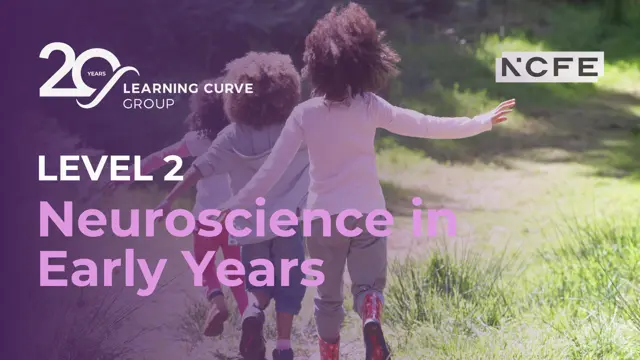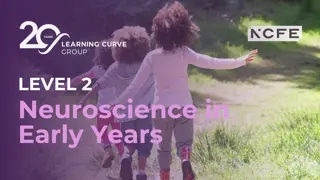
Level 2 Award in Neuroscience in the Early Years
Complete online for FREE when it suits you, with materials and tutor support. Learn about child development.
Learning Curve Group
Summary
If you are 19 years old or older living in England, the course will be free to you as it is funded...
- Certificate of completion - Free
- Tutor is available to students
Add to basket or enquire
Overview
This qualification provides an introduction to neuroscience in the early years – from birth to seven years. Self-regulation in the early years is a critical set of skills that help children to remain calm, attentive, and able to deal with powerful emotions such as fear, anger, and sadness. Children are not born with these skills; they develop them over time when they are supported to understand their feelings and actions by caring and responsive adults.
This qualification covers key factors that may affect development in children, such as stress, adverse childhood experiences, and special educational needs and disabilities.
Qualification
NCFE CACHE Level 2 Award in an Introduction to Neuroscience in Early Years
Description
This course is made up of two units.
Understanding neuroscience in early years:
- Neuroscience of early brain development
- Neurons and their main functions
- Synaptogenesis
- How the social brain develops
Understanding self-regulation and how to nurture this in children from birth to seven years:
- The Limbic System
- Self-regulation
- Special Educational Needs and Disabilities (SEND) and influences that can affect a child's ability to self-regulate
- Coregulation and its role
- Stresses which impact on children
- Adverse childhood experiences and how they influence long-term well-being and development
- The difference between predominant behaviours and alternative relational approaches and policies in behaviour management
Who is this course for?
If you choose to do this Level 2 Course in Introduction to Neuroscience in the Early Years, it could lead to careers in Education and Childcare. This is especially useful for careers like;
- Teaching Assistant (£11,500 to £23,000)
- Nursery Worker (£14,000 to £24,000)
- Learning Mentor (£14,500 to £25,000)
Understanding how the early brain develops and the impacts of adverse childhood experiences, special educational needs (SEN) and stresses can have on child development is particularly useful for early years educators and practitioners.
Requirements
ELIGIBILITY
- You must live in England and be over 19 years old. To enrol you must have your National Insurance number, a form of Identification, employment documents and details of your previous qualifications. This process can take 10-20 minutes.
*Please note there is a £125 cancellation fee if a learner enrols and fails to complete or withdraws early from the course. This fee is to cover administration costs. We may be able to offer extensions if learners are unable to meet the set submission deadline. Please read the declaration on the enrolment form carefully before signing up.
Career path
This career is for anyone who works with children in the early years. It is particularly useful for people working in childcare settings, such as early years educators, childminders, teaching assistants and SEN professionals.
Certificates
Certificate of completion
Hard copy certificate - Included
Reviews
Currently there are no reviews for this course. Be the first to leave a review.
Legal information
This course is advertised on reed.co.uk by the Course Provider, whose terms and conditions apply. Purchases are made directly from the Course Provider, and as such, content and materials are supplied by the Course Provider directly. Reed is acting as agent and not reseller in relation to this course. Reed's only responsibility is to facilitate your payment for the course. It is your responsibility to review and agree to the Course Provider's terms and conditions and satisfy yourself as to the suitability of the course you intend to purchase. Reed will not have any responsibility for the content of the course and/or associated materials.



